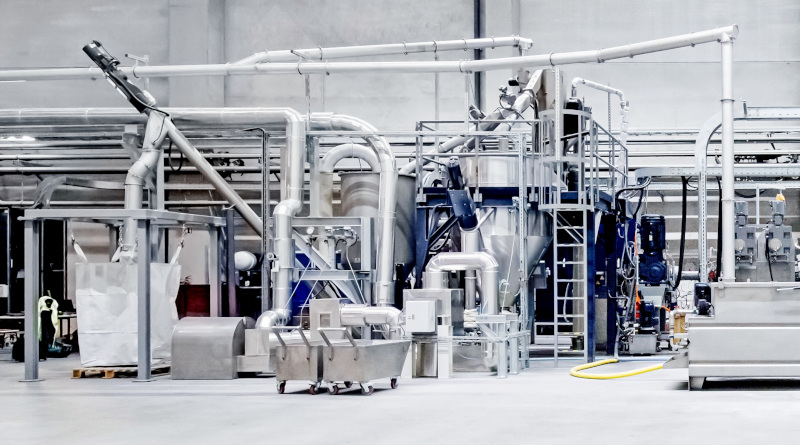“The demand for rPET is increasing“
Producing food contact compliant rPET – One of the first Vacunite bottle-to-bottle systems by Erema started operation in Werne, Germany, in spring 2020. Using this system, the RCS Group, who already produced PET flakes for the non-food sector, is expanding their plastics recycling division to include the production of food-grade PET recyclate for food and beverage packaging, films and blisters.
For the further processing of PET flakes, the waste disposal and recycling group has built a new location on a 10,000 m2 site, creating 20 additional jobs. Here, the Vacunite recycling system launched by Erema a few months previously will process up to 15,000 t/a of PET flakes from the German deposit bottle collection system and other European sources to make high-quality recyclate – vacuum-assisted and in a nitrogen atmosphere. Due to the strict travel restrictions during the Corona-lockdown in spring, commissioning the plant became an unexpected challenge for everybody involved. The plant components had already been delivered, but since the installation team was not permitted to travel to Germany, RCS started to assemble the recycling plant themselves. An Erema team was then able to be on site for commissioning.
New standard for recycled material quality
RCS now operates seven days around-the-clock to produce rPET that meets all existing FDA and Efsa specifications for direct food contact and the often even stricter regulations of well-known beverage brands. It also clearly exceeds the customer’s expectations. “Our analyses indicate that for all potential contaminants we achieve values that are significantly below our target values or are not detectable at all,” explains Alexander Rimmer, Managing Director of the RCS Group.
Vacunite is based on the combination of Vacurema technology – which has been proven over the past 20 years and Erema has further developed for this application – together with newly patented vacuum-assisted Solid State Polycondensation (SSP) technology, which was also specially developed by Polymetrix for this demanding application. All thermal process steps now take place in nitrogen and/or vacuum atmosphere. Discolouration of flakes and pellets is largely eliminated and additives that could lead to undesired reactions in the melt are reliably removed. In addition to these quality factors, this new technology minimises energy consumption.
The process requires 40 per cent fewer components and consumes up to 36 per cent less energy than comparable systems on the market. The energy consumption for the entire production process from flakes to the final pellets is only 0.35 kWh/kg, which also complies with the internal sustainability standards at RCS. Following the commissioning of the Vacunite system with a throughput capacity of up to 1.8 t/h, RCS can now offer its customers not only high-quality rPET flakes but also rPET pellets that are food contact compliant.
The cooperation between RCS and a leading PET bottle and preform manufacturer illustrates how a closed plastic cycle can be implemented, taking the PET material obtained from the German deposit system as an example. Alexander Rimmer says: “The recycling process of PET bottles returned by consumers to deposit machines begins in our group of companies as early as the collection stage. We turn the bottles into washed flakes, which are then processed using the new Vacunite system to produce food contact compliant recycled pellets. Our customer uses this in proportions of up to 100 per cent to produce new preforms and bottles, which in turn end up in the retail trade and in households. This means that the cycle is completely closed and completely transparent to consumers, who can trace the route from the deposit machine back to the retailer.”
Christoph Wöss, Business Development Manager at Erema Group GmbH, is also convinced that this route will be a successful one in the future: “Like our customers, we are convinced that plastic recycling will not lose its importance as a significant contributor to the circular economy and that the demand for high-quality recycled pellets will continue to increase over the medium term.” The reasons for this are both the voluntary commitments of all well-known brand manufacturers in the beverage industry, as well as legal conditions such as the European Union’s requirements for the recycling of PET bottles and for the minimum recyclate content in new PET bottles.
Due to the positive experience with the first Vacunite plant, RCS has already set the course for starting up a second recycling line. It should enter production as early as spring 2022. “The decision to go for another Vacunite machine was easy for us,” says Rimmer: “The demand for rPET is increasing, the quality has exceeded our expectations, and the entire process from planning to installation and commissioning has been trouble-free.” With the second Vacunite bottle-to-bottle line, RCS will then be able to increase its recycled pellet capacity to over 50,000 t/a.

